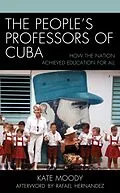The People's Professors: How Cuba Achieved Education for All describes how Cuba managed, in spite of scarce resources, to successfully educate its entire population after the revolution in 1959. It details how illiterate peasants learned to read and write, how the nation's vision of education was developed, how the national school system was doubled in size, thousands of teachers were educated, and now-how Cuba is entering the realm of digital media and the internet. The people of Cuba can read and write better than the citizens of most countries, including the United States. Moreover, Cubans excel on international measures of math, science, the arts, and healthcare. This book considers Cuba's schools as well as its integrated systems such as healthcare and community mental health, and makes a case for the principles that education is a human right, and that teaching is the responsibility of everyone.
Autorentext
Kathryn Moody is fellow at the IC 2 Institute at the University of Texas in Austin.
Klappentext
The People's Professors: How Cuba Achieved Education for All describes how Cuba managed, in spite of scarce resources, to successfully educate its entire population after the revolution in 1959. It details how illiterate peasants learned to read and write, how the nation's vision of education was developed, how the national school system was doubled in size, thousands of teachers were educated, and now-how Cuba is entering the realm of digital media and the internet. The people of Cuba can read and write better than the citizens of most countries, including the United States. Moreover, Cubans excel on international measures of math, science, the arts, and healthcare. This book considers Cuba's schools as well as its integrated systems such as healthcare and community mental health, and makes a case for the principles that education is a human right, and that teaching is the responsibility of everyone.
Inhalt
1.The Curiosity that Led Me to Cuba
2.Education in Pre-Revolutionary Cuba
3.The Literacy Campaign: How They Did It
4.Worker-Farmer Education
5.Early Childhood Education and Pre-School
6.Secondary Schools and Beyond
7.Non-Formal Education in the Communities
8.Educating the Educators: Then and Now
9.The Next Revolution: Internet
10.A Lot to Learn from Cuba!
11.Epilogue: The University and I
Rafael Hernández
References
About the Author
